International Women’s Day: The founder of the firm
31 March 2023

RELATED! Survey reveals gender bias in Hong Kong's legal sector
Changing up the gear.
That is what Joyce A. Tan, managing director at Joyce A. Tan & Partners in Singapore, calls it.
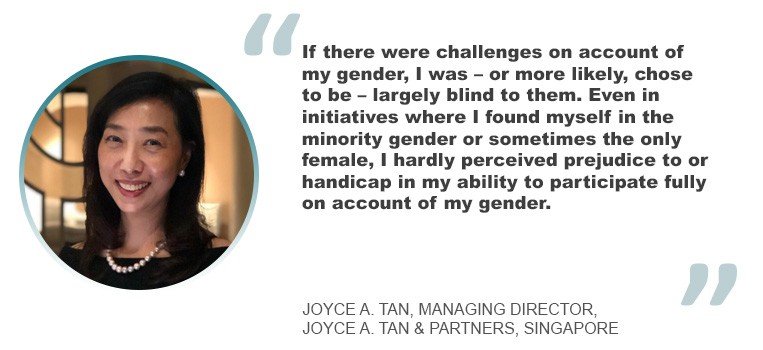
“I wanted to change up the gear. As head of department in a large firm at that time, I found a need for an environment where the runway between decision and action was shorter, where I could re-imagine and re-create the future, where I could spread my wings a little wider, journey with less baggage and not feel shackled by the definitions of others before and around me,” she explained.
She went soul-searching. In the end, she realized she needed to reboot. The result of her soul-searching journey was Joyce A. Tan & Partners, established in 1998.
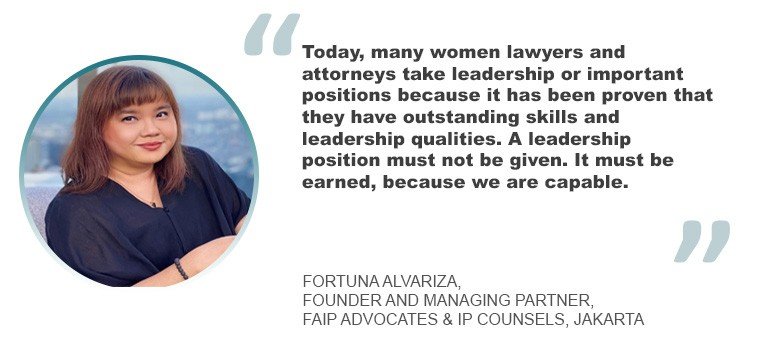
Fortuna Alvariza, founder and managing partner at FAIP Advocates & IP Counsels in Jakarta, worked at a French law firm in Versailles and at well-established Indonesian firms, including an affiliate of a Singaporean firm. Her track record also includes a stint as in-house counsel for a major food and beverage company.
Putting to use the knowledge she acquired from her combined experiences working in multicultural environments, Alvariza put up her law firm in 2011, injecting her own work style into the system. “My dream was to establish a law firm that consists of a reliable team. On the other hand, the law firm must be considered by the team itself as the right place to become professionals who are able to provide clients with the best legal services,” she said.
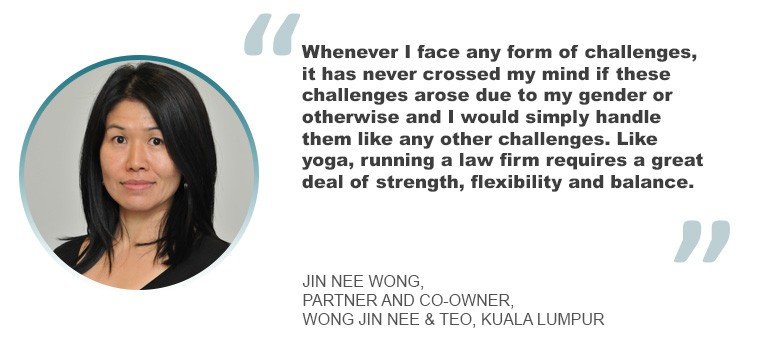
To build a firm based on their values, beliefs and culture and be able to shape the direction of the firm in the manner they want was what prompted Jin Nee Wong, partner and co-owner at Wong Jin Nee & Teo in Kuala Lumpur, to establish a law office with her partner Bong Kwang Teo in 2005.
“We also saw gaps and opportunities in the legal landscape in that there were very few IP boutique firms at that time,” Wong revealed.
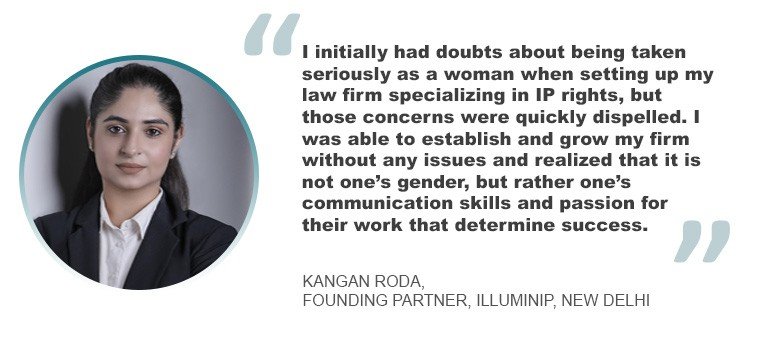
Kangan Roda, founding partner of illuminIP in New Delhi, said she has always been passionate about IP. Her main reason for establishing her own firm was her desire to provide specialized, high-quality legal services in IP and create a culture that prioritizes client needs.
Aside from this, Roda also saw the growth of technology as another impetus. “As the economy and technology continue to evolve, the need for legal services in the field of IP rights also increases. This motivated me to establish a firm that could meet that growing need,” she pointed out.
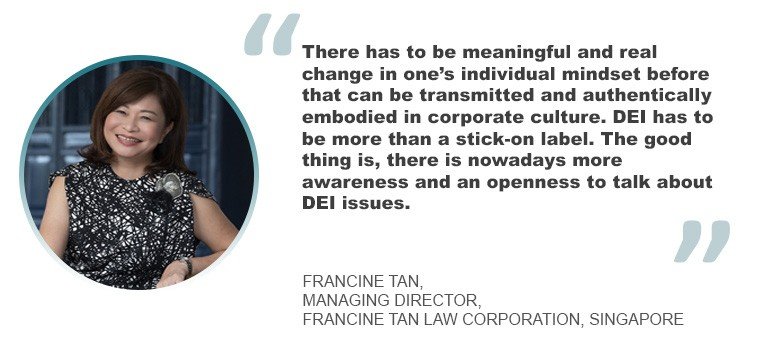
Back in 2009, Francine Tan, managing director of Francine Tan Law Corporation in Singapore, was considering a change of environment and doing things differently career-wise.
“Maturity in age also brought me to a place where some things didn’t sit as well with me as before and I found myself in a state of readiness to make a change for myself and not simply bear and tolerate those things,” she said.
The year after, she founded Francine Tan Law Corporation and never looked back.
Whatever their reasons are for deciding to go on their own, the ladies are definitely happy with the path they chose. It gives them the autonomy and flexibility to fully control their firms’ operations. Whether or not they own their time, they certainly get to choose what work to focus on.
“The driver’s seat in a roadster gives you a much better view. The road handling there is more exciting and fulfilling than sitting in a bus,” shared Joyce Tan, “even in the driver’s seat of a bus.”
“Bringing in your own ‘catch of the day’ is definitely more fulfilling and tastes better than buying prepacked fish from the supermarket,” added Francine Tan.
She explained that in the beginning, she had to do things on her own, including to “fish” on her own. This meant that because Francine Tan Law Corporation was a new kid on the block, it hadn’t acquired the famous name, goodwill and established relationships that an office with more years behind it possessed. Therefore, gaining the trust of potential clients took time, patience and persistence.
That wasn’t the only problem though. Some of them encountered challenges in connection with their gender.
Francine Tan recounted how she occasionally experienced prejudice in the early years of legal practice, in the course of operating her law firm or at networking events.
“It was disheartening, frustrating and even offensive at times but I learned to grow a thick skin over time and not let that keep me in a state of defeat. Diversity, equity and inclusion (DEI) was not a concept that featured in conversation or mindsets of companies and management 10 to 20 years ago,” she said.
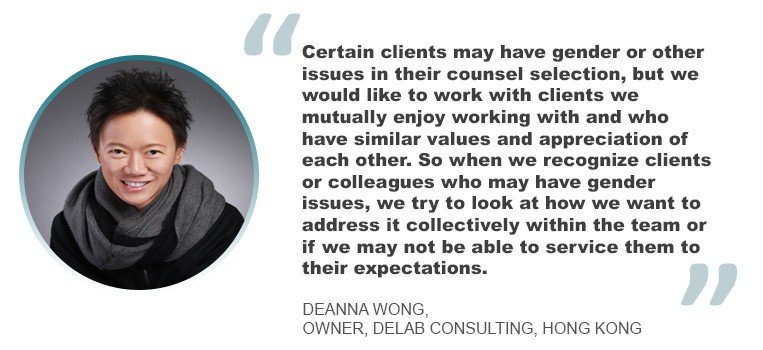
“Yes, they are under-represented generally. However, for IP practitioners, I would say it is more balanced,” said Deanna Wong, owner of DeLab Consulting in Hong Kong, when asked if women lawyers/attorneys in Hong Kong are under-represented in leadership positions within their organizations.
“The underlying reason, I think, for those who are under-represented, is a mixture between conscious and unconscious bias,” she said.
“Certain clients may have gender or other issues in their counsel selection, but we would like to work with clients we mutually enjoy working with and who have similar values and appreciation of each other. So when we recognize clients or colleagues who may have gender issues, we try to look at how we want to address it collectively within the team or if we may not be able to service them to their expectations,” she added.
For Joyce Tan, blissful ignorance of gender barriers, or the choice of it, is a blessing.
“If there were such challenges on account of my gender, I was – or more likely, chose to be – largely blind to them. Even in initiatives where I found myself in the minority gender or sometimes the only female, I hardly perceived prejudice to or handicap in my ability to participate fully on account of my gender,” she explained.
Admitting she is not aware of the statistics, Tan believes the under-representation of women in leadership positions in Singapore’s legal community is, however, not necessarily on account of gender biases alone. For example, family may be a consideration for some women who prioritize family over career and opt to forego opportunities for key leadership appointments within their organizations.
Indeed, having the right attitude is the key.
An avid yogi, Jin Nee Wong applies yoga teachings and principles off the mat, including at work whenever challenges arise.
“Whenever I face any form of challenges, it has never crossed my mind if these challenges arose due to my gender or otherwise and I would simply handle them like any other challenges,” she said. “Like yoga, running a law firm requires a great deal of strength, flexibility and balance.”
Actually, not only are there more women lawyers in Malaysia, but there are more women lawyers occupying leadership positions in law firms in the country, based on Jin Nee Wong’s observation and as far as the IP community is concerned.
The same goes for women lawyers in Indonesia and India.
“I am pleased to find that women lawyers and attorneys are not under-represented in leadership positions in various organizations, such as a professional organization like the Indonesian Bar Association,” said Alvariza.
“I initially had doubts about being taken seriously as a woman when setting up my law firm specializing in IP rights,” revealed Roda, “but those concerns were quickly dispelled. I was able to establish and grow my firm without any issues, and realized that it is not one’s gender, but rather one’s communication skills and passion for their work that determine success.”
According to Roda, the number of women assuming leadership positions in the legal profession has grown significantly in India in recent years.
Regardless of any doubts they may have had initially and the hurdles they’ve faced, the ladies are definitely happier and more fulfilled now compared to their pre-entrepreneurship days.
“Fulfillment in the type of work we do and seeing the impact we make has been amazing,” said Deanna Wong, citing self-recognition as another element in her great journey.
Such impact does not cascade to clients alone, but also to colleagues and employees.
“By building a team of like-minded individuals, I am able to encourage them to practice law in their own way, which has been incredibly rewarding,” Roda shared.
As the top man, or woman, in their own law firm, what can a female lawyer or attorney bring to the table?
Our interviewees tick off the positive qualities that make women good leaders: ability to multi-task; empathize; balance and risk manage, which they generally do without letting ego get in the way, and with laser focus on results delivery but not necessarily at the expense of people and their needs; resiliency; patience; great communication; and mentorship skills.
It’s the female psyche at work, according to Joyce, and with that comes intuition, holistic conflict and emotional management skills and a greater tendency towards a servant leadership style, aside from empathy.
“They can bring a unique and different approach to problem-solving, decision making and communication. They can also bring a fresh perspective on how to build and manage a team, foster a positive work culture and promote equality and diversity in the workplace. They can also bring a unique insight on how to handle work-life balance, which can be beneficial for the entire organization,” said Roda.
Fact is, research has shown that companies with more women occupying key positions tend to perform better financially.
In the past, gender biases may have infested the legal profession in general, preventing capable women from ascending the hierarchy to occupy esteemed positions in the organization.
But the landscape is changing. Women professionals have proven their worth and capability. As Roda said, it’s their talent that shines through now, not their gender or skin colour. Amid the clamour for DEI, there is greater representation of females in leadership roles at present.
Yet, the picture isn’t perfect where calls for DEI are concerned.
In some countries in the past, certain organizations provided women with the opportunity to climb the corporate ladder just to comply with gender equality policies.
“Although some strongly and genuinely believe in it, others ultimately merely give lip service to it or worse, engage in ‘diversity washing’ with no real belief or commitment to it,” Francine Tan explained.
The good news is, things are changing.
“Today, many women lawyers and attorneys take leadership or important positions because it has been proven that they have outstanding skills and leadership qualities. A leadership position must not be given. It must be earned,” said Alvariza, “because we are capable.”
“There has to be meaningful and real change in one’s individual mindset before that can be transmitted and authentically embodied in corporate culture. DEI has to be more than a stick-on label,” Francine Tan added. “The good thing is, there is nowadays more awareness and an openness to talk about DEI issues.”
Though she never looked back after setting up her own firm, Alvariza acknowledges that entrepreneurship is not the only route female lawyers and attorneys can take.
“Several colleagues prefer to become in-house counsels. Some others prefer to pursue their career in a law firm,” she said.
What’s important, Alvariza emphasized, is to become a reliable lawyer who loves what she does.
Alvariza and the rest of our interviewees love what they do. They’re also mighty proud of their achievements as legal professionals who were bold and determined enough to establish their own law firms – firms which clients can rely on.






